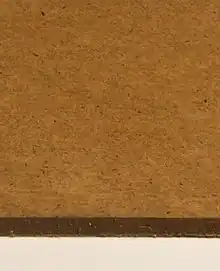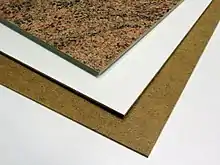Hardboard
Hardboard, also called high-density fiberboard (HDF),[1] is a type of fiberboard, which is an engineered wood product.[2] It is used in furniture and in the construction industry.



Description
Hardboard is similar to particle board and medium-density fiberboard, but is denser and much stronger and harder because it is made out of exploded wood fibers that have been highly compressed.[3] Consequently, the density of hardboard is 500 kg/m3 (31 lb/cu ft) or more[4] and is usually about 800–1,040 kg/m3 (50–65 lb/cu ft).[5] It differs from particle board in that the bonding of the wood fibers requires no additional adhesive, the original lignin in the wood fibers sufficing to bond the hardboard together,[6] although resin is often added.
Hardboard is produced in either a wet or dry process. The wet process, known as the Mason Method,[7] leaves one smooth side and one textured side, while the dry processed hardboard is smooth on both sides. Masonite is produced using the wet process only.
History
A product resembling hardboard was first made in England in 1898 by hot pressing waste paper.[8] In the 1900s, fiber building board of relatively low density was manufactured in Canada. In the early 1920s, improved methods of compressing wet wood pulp at high temperatures resulted in a higher density product.[8]
Uses
Unlike solid wood, hardboard is very homogeneous with no grain. A wood veneer can be glued onto it to give the appearance of solid wood. Other overlays include Formica, laminated papers, ceramics, and vinyl. It has many uses, such as a substrate. It is used in construction, flooring, furniture, home appliances, automobiles and cabinetry, and is popular among acrylic and oil painters as a painting surface due to its economical price (though it must be coated with gesso or canvas before use).[9] Hardboard has often been used as the surface material in clipboards, especially older models. It is also used as the final layer in many skateboard ramps and the half-pipe. Hardboard is also used extensively in theatrical environments, often used as the final painted surface of a stage and on walking surfaces of constructed scenery. Hardboard is also used to make puzzles, game boards, and other toys.
Tempered hardboard is a hardboard that has been coated with a thin film of linseed oil and then baked; this gives it more water resistance, impact resistance, hardness, rigidity and tensile strength. An earlier tempering process involved immersing the board in linseed oil or tung oil until it was 5 to 6 percent saturated, and heating to 170 °C (338 °F).[10] Tempered hardboard is used in construction siding.

Perforated hardboard, also called pegboard, is tempered hardboard that has a uniform array of 1⁄8-or-1⁄4-inch (3.2 or 6.4 mm) holes in it, into which tool-hanging hooks or store fixtures can be placed.
Hardboard has become less popular in the construction industry in recent years due to new environmental targets[11] to procure more sustainable temporary protection materials.
See also
- Fibro (fibrous asbestos cement board)
- Glued laminated timber
- Masonite
- Oriented strand board
- Plywood
- Pressed wood
Citations
- Gardziella, Arno, André Knop, and Louis A. Pilato (2010). Phenolic Resins: Chemistry, Applications, Standardization, Safety and Ecology. Berlin: Springer. p. 142. ISBN 3540655174.
- "Hardboard, Perforated Board, Underlayment, Office Furniture – Composite Panel Association". Archived from the original on 2015-03-18. Retrieved 2013-08-16.
- Gesimondo, Nancy, and James Christopher Postell. (2011). Materiality and Interior Construction. Hoboken, N.J.: Wiley. p. 365. ISBN 9780470445440.
- Frane, 1994, p. 156
- Hoadley, R. Bruce (2000). Understanding Wood: A Craftsman's Guide to Wood Technology. Taunton Press. ISBN 978-1-56158-358-4.
- Akers, 1966, p. 125
- U.S. Patent 1,578,609 & U.S. Patent 1,586,159
- Akers, 1966, p. x
- Christie's, Louis Valtat, "Child on the Carpet", 1910
- Akers, 1966, p. 140
- Government, HM. "Industrial Strategy: Government and Industry in Partnership" (PDF). www.gov.uk. HM Government. Retrieved 25 November 2014.